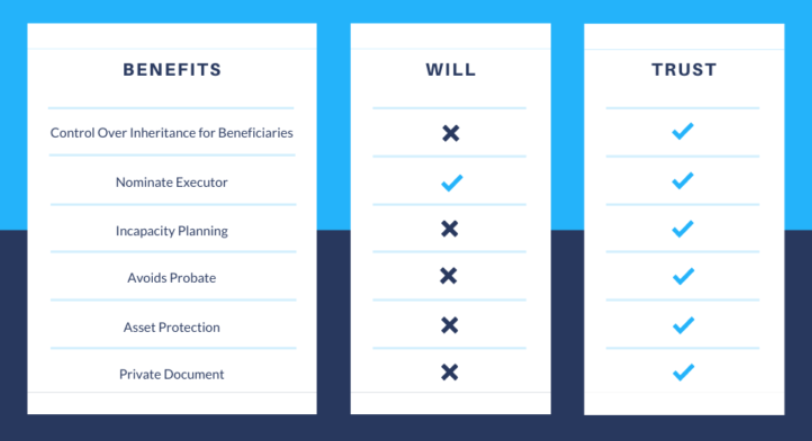Do you have a plan for how your assets will be distributed after you’re gone? Wondering Which is Better for Inheritance: a Living Will or Trust?
If you’re relying on a will to dictate these types of terms, you need to rethink your plan.
A will can express your wishes for after you’re deceased, but a will isn’t actually active until after you’re deceased.
For example, you could dictate in your will that if your child is in college at your death or has already graduated, they will inherit a certain amount of money.
Which Gives You More Control – A Living Will or Trust?
With a living will, you can’t easily dictate that they do something later in life to get access to the money.
That can be a huge problem.
You’ll have no control over what happens.
Living Will or Trust

So, what can you do to ensure that happens?
The answer is a Bulletproof Trust.
Private Irrevocable Bulletproof Trusts are the perfect vehicles for inheritances and a much stronger alternative to a living will.
You choose the terms (no matter how detailed). You set the conditions.
That means you make the rules.
It’s easy to use a trust when you want to leave money or assets to your kids with strings attached.
With a trust, the trustee, who is in charge of the trust assets, will decide whether or not to release funds, based on the trust document and beneficiary’s behavior.
Let’s say you want your kids to meet certain milestones, like reaching a certain age, before getting access to the money you left them.
You set the milestones.
Maybe you want them to receive a portion of the money at certain times. Perhaps every year or every 10 years.
Or, maybe you want to reward your child for pursuing a higher education. You can leave the money in a trust and set a conditional release of the money.
All it takes is a trust document that states you leave the money to your child, provided they meet the milestones or conditions you have outlined in your trust document.
If they do, the trustee will give out the money when the milestone or condition is reached.
This puts YOU in control.
And, it does all of this while shielding your loved ones from the high cost of estate taxes.
A will can’t do any of these things, but it can put your assets, your wishes — and your loved ones’ inheritances — at risk.
We believe you should be the one in control of your wealth – at Private Wealth Academy, it’s our mission to give you the tools you need to protect your wealth. A Bulletproof Trust is the perfect tool to help you achieve PRIVATE asset protection.
Learn More About the Bulletproof Trust
Don’t assume that a will has you or your loved ones covered. Only a Bulletproof Trust can ensure that whatever terms and conditions you set for your money and estate are met.
The good news is – if you choose, you can have BOTH a will and a trust!
Take the right steps now to learn how you can make sure your money wishes are met (now and after you’re gone). With the tax write-off, it won’t even cost you a dime.
Your friends in finance,
Private Wealth Academy
Leave a Reply
You must be logged in to post a comment.